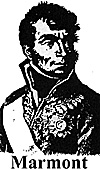Napoleon was directing the Spanish war from Paris, and his word was law. Communications were basic, so different from those of the late 20th century: it took three weeks for dispatches to travel each way between France and Spain, making a total of six weeks in all. The Emperor took exception to action taken by Marmont referred to in the letter of 23rd January, quoted below.
Marmont reckoned, not without good reason, that Paris knowledge of what was going on in Spain was out of date, and people on or near the battlefields were best placed to make operational decisions. As far as the Emperor was concerned, Marshal Marmont was there to obey orders: personal judgment and the local knowledge were irrelevant. He was accused by the Emperor of seeking personal glory instead of acting for the good of the service which must have made him very angry indeed.
From the Major General to Marshal Marmont
Paris, 23rd January 1812
I am sending you, M. le Maréchal, a copy of the "Moniteur" [1] which will show you the state of affairs in Valencia. The Emperor has noted with irritation, M le Duc [2] , the unsatisfactory orders you gave to General Montbrun, and that your orders and counter-orders given have neutralised the movement laid down by His Majesty. You received, an order on the 13 December to send six thousand men to Cuenca to reinforce General Armagnac's troops and thus to advance rapidly on the Spanish corps which was at Requeña en Utile. His Majesty was under the impression that this movement had been carried out on the 24th or 25th.
Clearly, His Majesty's orders have been ignored.. It would seem that you were not happy with these dispositions so instead of a flying column with which the Emperor wanted you to attack Cuenca, you decided to march on the city with thirty guns instead. His Majesty, I must tell you, M le Maréchal, thinks that in the circumstances, you were more concerned with personal glory, than what is best for the service. You know the Emperor well enough, M le Maréchal, to realise that had he wanted to operate a big diversion with an Army corps and 30 heavy guns on Valencia, he would have ordered you to go via Almanza. The result of all this is that one month after you received the Emperor's order to send a corps of six thousand men to Cuenca, the enemy has had the upper hand at Requeña, and thus you have done the Army of Valencia no favours whatsoever.
The Emperor, M le Duc, hopes that this letter will reach you at Valladolid. He commands you strictly to carry out the following orders:
1st Recall General Montbrun's corps if you have not already done so.
2nd Twenty-four hours after having received this order, you are to send one of the divisions of your army, together with artillery, without any reorganisation, to Burgos to become part of the Army of the North. His Majesty forbids you to change any general officer of the division whom you will send, and expects you to make no other alteration whatsoever.
In exchange you will receive three infantry regiments, 5,000 men in all, that you will incorporate into your regiments. They will leave their current posting on the same day as those the Emperor has ordered you to send to Burgos. All the National Guard have been ordered back to France, but that can only be done when you have sent your people to Burgos.
When Valencia has been taken, General Caffarelli is to report to the Pamplona garrison and his troops will then become part of the Army of the North. This army will be composed of three divisions, that is to say: those which I have ordered you to send there; Caffarelli's division and a third division which General Dorsenne will be forming with the 34th Light, the 113 and 130 of the Line as well as the Swiss.
The cavalry of this army will be formed from the regiment of Berri Lancers, the 1st Hussars, the 15th and 34th Chasseurs, and the Légion de gendarmerie à cheval.
Thus, the Army of the North will be in a position to come to your assistance if the English march against you. If this happens, General Reille, who, as soon as Valencia has been taken, will have command of the Army of Ebro, will be able to send a division from Saragossa to Pamplona. But this can only take place where the English deploy a large number of troops and make an offensive movement upon you, which is unlikely. Once Valencia has been taken, Marshal Suchet will remain in the province with 25,000 men. General Reille will be at Lerida with the Ebro Corps, 32,000 strong, excluding the garrisons from Lower Catalunia. They will be stationed either at Lerida or at Saragossa. General Dorsenne will be at Burgos with the Army of the North, 38,000 strong.
I have already alerted you that the three Polish regiments at present in the Army du Midi have been ordered back to France. When they pass through Valladolid, be so kind as to speed their passage and do not delay them in any way.
Mémoires du Duc de Raguse, Tome 4, livre XV, p 78 et seq
 To be one of Napoleon's Marshals was no picnic, especially for Marshal Marmont during late 1811 and early 1812. Neither he nor the Emperor believed that the Ciudad Rodrigo could possibly fall to the English at this time because, they reckoned, no-one in their right mind would attack the city in the middle of winter. The Brits, they presumed, would wait until the weather was favourable and Napoleon's Chief of Staff wrote to Marmont on 13th December 1811 along these lines:
To be one of Napoleon's Marshals was no picnic, especially for Marshal Marmont during late 1811 and early 1812. Neither he nor the Emperor believed that the Ciudad Rodrigo could possibly fall to the English at this time because, they reckoned, no-one in their right mind would attack the city in the middle of winter. The Brits, they presumed, would wait until the weather was favourable and Napoleon's Chief of Staff wrote to Marmont on 13th December 1811 along these lines:
If General Wellington, after the rainy season is over (after February) should determine to take the offensive, you can then unite all your eight divisions for a battle. . . . But such a move is not to be expected. The English, having suffered heavy losses, and experiencing great difficulties in recruiting their army, all considerations tend to make us suppose that they will simply confine themselves to the defence of Portugal … It is necessary, therefore, to wait till the crops of the present year are ripe. (June)
 The letter below is a translation of one from Major General, later Marshal, Berthier, Napoleon's Chief of Staff, to Marshal Marmont. Berthier was an unusual character in that his family had been ennobled by Louis XV, and had survived the onslaughts of the Revolution. He became Napoleon's Chief of Staff in1796 and this association between the two men continued almost uninterrupted from this time until 1814. Berthier's gifts were, as can be seen from his letter, as a staff officer, pretty considerable, but he was less successful on the field of battle. The letter was written two days after the capture of Ciudad Rodrigo by the English and Portuguese armies. News of this would not reach Paris for a couple of weeks at least.
The letter below is a translation of one from Major General, later Marshal, Berthier, Napoleon's Chief of Staff, to Marshal Marmont. Berthier was an unusual character in that his family had been ennobled by Louis XV, and had survived the onslaughts of the Revolution. He became Napoleon's Chief of Staff in1796 and this association between the two men continued almost uninterrupted from this time until 1814. Berthier's gifts were, as can be seen from his letter, as a staff officer, pretty considerable, but he was less successful on the field of battle. The letter was written two days after the capture of Ciudad Rodrigo by the English and Portuguese armies. News of this would not reach Paris for a couple of weeks at least.
Notes:
[1] The official government newspaper
[2] His full title was Duc de Raguse
Source:
Back to Table of Contents -- First Empire #35
Back to First Empire List of Issues
Back to MagWeb Master Magazine List
© Copyright 1997 by First Empire.
This article appears in MagWeb (Magazine Web) on the Internet World Wide Web.
Other military history articles and gaming articles are available at http://www.magweb.com
